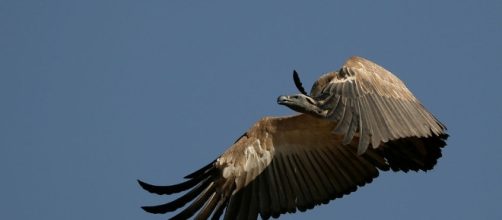Vultures are becoming increasingly rare across the world. Marakele National Park, just three and a half hours by road from Johannesburg's Oliver Tambo International Airport, is one of the best places to spot them. The SANParks website describes the park as the home of the "largest colony of Cape Vultures in the world (around 800 breeding pairs)."
Vulture on red data list
Cape Vultures are on the list of Red Data Species, where they are classified as “threatened” and “vulnerable.” Despite our more modern approach to conservation, there are still some farmers who deliberately poison vultures, while others are inadvertently killed through consuming dead livestock that has been treated with veterinary medicines.
Poachers will lace waterholes with poison and the scavenger vultures die when they consume the carcasses. Roadkill is common in nearby Botswana, as is electrocution from power lines.
Vultures in Marakele have relatively safe breeding environment
While the Marakele Vultures often feed across the border in Botswana, they can at least return to the protection of Marakele to raise their young in a relatively safe environment. Nevertheless, despite breeding in the reserve, the young vultures sometimes die after tangling with the support stays of the communication towers atop the cliffs in the reserve.
Ironically, it is the road up into the Kransberg/Waterberg Mountains that services the communications towers that give bird lovers access to the heights where these magnificent birds breed.
According to Kwevoel, "preventative measures like the orange balls or flappers on the guy wires," have been taken to prevent young birds from dying after a collision with the stays, but they are still occasionally killed. Sadly, the population is not as stable as nature enthusiasts would wish. Numbers are down by 200 breeding pairs since the initial studies of the vultures began in 1981.
Journey to Marakele
We set off to find the Markalele National Park Cape Vultures at a comfortable 10 AM and booked into our tented camp at Bontle Camp by 2 PM. Our route was straight out of Pretoria via the N1 north, taking the offramp to Bella Bella (Warmbaths), and then up to Thabazimbi on the R516. The reserve is close to the town of Thabazimbi, which is useful as there are no restaurant, service station for fuel or shop facilities in the reserve itself.
Camp facilities and choices
The area is divided into a number of different sections, with Bontle being the most accessible for people with normal sedan vehicles. There are campsites and tented camps in the Bontle section, along with a bird hide and a network of roads where animals can be seen. We opted for Bontle as there is at least an intermittent cellphone signal, but if that is not important to you, the Tlopi Tented Camp in the eastern section would be the best choice for spotting vultures. The tented camp at Tlopi is arranged around a waterhole and the elephants frequent the area. The unfenced camp is much closer to the vulture colony than the Bontle camp, but sedan vehicles may struggle with the gravel roads and steep inclines.
Getting to the cliffs
Warning - if you are afraid of heights or uncomfortable on a narrow and very steep road with no side barrier, I would not advise you take the drive up to the top.
Marakele Cape Vultures very steep road up the waterberg pic.twitter.com/hlg1hG49PS
— Jane Flowers (@zimkwacha) October 21, 2017
Right up at the very top of the mountain, there is a place to park and if you look carefully, you find little yellow feet painted on the rocks that show you the way to the best viewpoint. Once again, it is not made clear enough that this activity may not suit some people. There are no guard rails.
Scouting out the Marakele Vulture colony pic.twitter.com/WJLSLrpkCU
— Jane Flowers (@zimkwacha) October 21, 2017
Getting down the rough path to the area where the Cape Vultures can be seen along the edges of the cliffs is a bit of a mission.
There is no clearly defined path and people with physical disabilities, or the elderly will find it heavy going. However, even up in the car parking area, a bit of patience will reward bird watchers as the vultures soar overhead from to time. For the true bird lover, there is no time to get bored while you wait. Chats entertain in their friendly manner and sugar birds enjoy the proteas.
Despite rumors of a vulture restaurant at Marakele, there is not one. As a vulture watching experience, we rated this a 10 out of 10. Accessibility, facilities, and visitor information came in lower at about 5/10. However, from a conservation viewpoint, the less disturbance these rare vultures have to endure, the better. So from a conservation perspective, we rate the Marakele Vulture spotting experience at 9/10.
Bookings for Marakele can be made online through SANParks.org.

